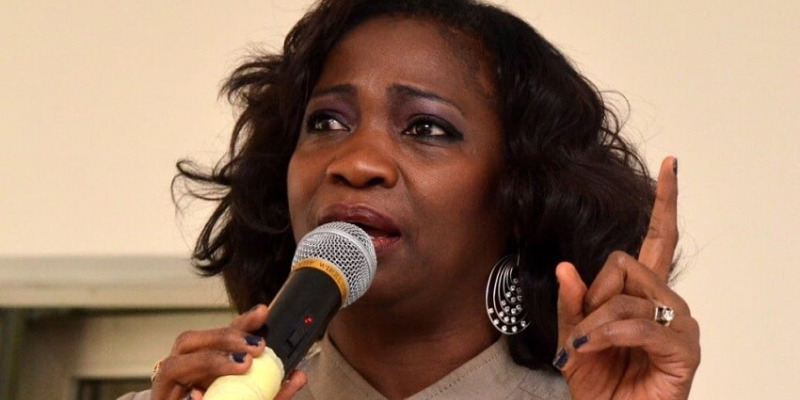The Chairman, Nigerians in Diaspora Commission, NIDCOM, Abike Dabiri-Erewa, has kicked against comments made by an Arise TV female anchor, Ayo Mairo-Ese on Emdee Tiamiyu’s interview with the British Broadcasting Corporation, BBC.
The NICOM boss expressed dismay over the disposition of the TV’s broadcasters and presenters over Tiamiyu’s comment, which is believed to have corroborated the ban of Nigerian students from bringing their dependants to the United Kingdom.
Mairo-Ese had tackled President Muhammad Buhari on a Arise TV Morning show, for telling the UK government that Nigerian youths are lazy and criminally minded while Dabiri also called the youths drug dealers and cultists.
The presenter is quoted to have said, “I don’t know why Nigerians like to demarket Nigerians on the international scene. Take it back to 2016, our President had referred to Nigerian youths as largely lazy. And that United Kingdom should not grant them asylum because many of them are criminals.
“The chairman of NiDCOM, Dabiri also referred to Nigerian people as cultists and drug dealers.
“So what Emdee Tiamiyu has said is in accordance to what our leaders are saying,” she added.
Disturbed by Mairo-Ese’s comment, Dabiri-Erewa, on her official Twitter handle, debunked the claims made by the presenter.
She called for the orientation of the presenters – whom she referred to as ‘girls’ – of the television station.
Dabiri-Erewa said, “I worked hard to be where I am today, and if women nowhere your age and achievements feel the only way to bring you down is spew nonsense, they will meet their Waterloo!
“Nduka Obaigbena had better call these girls @ARISEtv ruining the broadcast profession to order,” she wrote.
Recall that Tiamiyu granted an interview to the BBC where he claimed that Nigerians seeking admission into school in the United Kingdom only considered it as an alternative means to escape from Nigeria.
Tiamiyu, who devoted his YouTube channel to advising Nigerians on studying in the United Kingdom noted that most Nigerians were not looking for new qualifications, but to start a new life abroad.
He said, “The student route is more like an answered prayer. It is a big bracket that’s able to take a lot of people, the ordinary people.”
“We’re beginning to see that a lot of people just hide behind the studentship. So the student thing is not real, it’s not like they need the degrees,” he added.
UK bars Nigerian students from bringing family members
By January 2024, Nigerians and other foreign nationals on study visa to the United Kingdom will no longer be able to bring in their family members, a new policy rolled out by the British government to curb migration revealed on Tuesday.
Under the proposals, only a limited number of those who come from abroad to study in the UK will still to be allowed to bring their partners or children to the country from January next year.
The crackdown on foreign students bringing dependants to Britain comes ahead of fresh migration figures to be released on Thursday.
Earlier, Home Secretary, Suella Braverman, had proposed a number of policies for immigrant students.
Under her plans, foreign students will be banned from bringing dependants to Britain with them unless they are on postgraduate research programmes; foreign students will no longer be able to switch out of the student route into work routes for staying in the UK before their studies have been completed.
Similarly, efforts will be made to clamp down on ‘unscrupulous education agents who may be supporting inappropriate applications to sell immigration not education.’
Ahead of Thursday’s release of official migration figures, some forecasts have suggested net migration could top 700,000 in the 12 months to December last year.
Among all nationalities, Nigerians represented the largest relative increase in sponsored study visa grants, which reached a record high of 65,929, a nearly 700% increase from 2019 and a 222.8% increase compared to the same period in 2021.
Meanwhile, the House of Representatives, on Tuesday, unanimously opposed a motion seeking to ask the United Kingdom to suspend the British Government’s restriction placed on international students from bringing their family.
A member of the House, Taiwo Oluga, had moved a motion of urgent public importance titled ‘Urgent Need to Urge the United Kingdom to Desist from Banning Nigerian Students Emigrants from Emigrating with their Families.’
Moving the motion, Oluga noted that Nigeria and the UK have had a long history that is mutually beneficial, starting from colonisation of Nigeria in the 19th Century, to granting independence to Nigeria in 1960, and to the post-independence bilateral relationship between them.
Oluga added, “The educational system in Nigeria, like many other national systems, is fashioned after that of the United Kingdom. This has led many Nigerians to seek employment as well as educational opportunities in the United Kingdom.”
But when the Speaker of the House, Femi Gbajabiamila, who presided over the session, put adoption of the motion to voice vote, the “nays” were more than the “ayes.”

